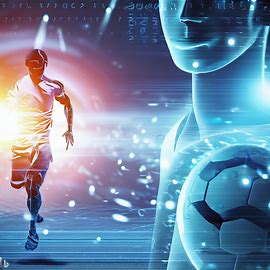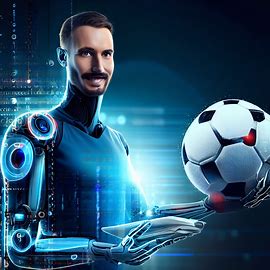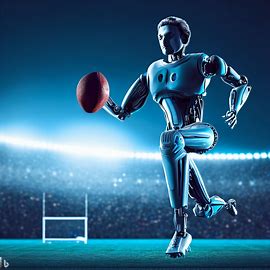Discover the potential impact of AI on sports. Learn about its applications in coaching, training, scouting, and fan engagement. Explore the challenges and opportunities, including ethical concerns, legal issues, and its social impact.

Introduction:
The concept of AI in sports and its potential impact–
Artificial Intelligence (AI) is transforming the world of sports. AI technology can help athletes and teams improve their performance, prevent injuries, and enhance fan engagement. With the increasing use of data analytics, machine learning, and other AI applications, the future of sports is likely to be shaped by this cutting-edge technology. In this article, we will explore the potential impact of AI on sports, and discuss the opportunities and challenges that come with it.

Opportunities for AI in sports:
How AI can help athletes and teams in areas such as performance analysis, injury prevention, and fan engagement?
AI has the potential to revolutionize the way athletes and teams train, perform, and engage with fans. For example, AI can analyze vast amounts of data on an athlete’s performance, providing personalized insights that can help them improve their game. It can also help coaches tailor training programs to individual athletes, reducing the risk of injury and improving overall performance.
Furthermore, AI can help with injury prevention by analyzing biomechanical data to identify potential risks and alert coaches and medical staff. This can enable them to take preventive measures to avoid injuries, or at least minimize their severity.

Challenges in implementing AI in sports:
Another area where AI can make a big difference is fan engagement. By analyzing fan data, AI can provide personalized recommendations for content, merchandise, and even stadium experiences. AI can also facilitate interactive experiences, such as virtual reality experiences, that can enhance the fan experience and build loyalty.
Some of the challenges that may arise in the use of AI in sports, such as ethical concerns, privacy issues, and bias-
While AI presents many exciting opportunities for sports, there are also some challenges that need to be addressed. One of the biggest concerns is around ethics. For example, there are questions around how data is collected and used, and whether AI could lead to unfair advantages or disadvantages for certain athletes or teams.
Another challenge is around privacy. As more data is collected and analyzed, it’s important to ensure that athletes’ and fans’ privacy is respected and protected. This can include making sure that data is stored securely and that it’s only used for its intended purposes.
Bias is another potential issue. AI algorithms are only as good as the data they’re trained on, so if the data is biased or incomplete, this can lead to biased outcomes. This could impact everything from talent identification to injury prevention.
Examples of AI in sports:
Examples of how AI is already being used in sports, such as in training and performance analysis-AI in sports technology:
- Wearable technology such as Fitbits and Apple Watches use AI to track an athlete’s performance, including heart rate, steps taken, and calories burned.
- Smart cameras use AI to capture and analyze data on an athlete’s movements, which can help coaches identify areas for improvement and prevent injuries.
- The NBA uses an AI-powered camera system called Second Spectrum to analyze and track player movement, providing coaches with real-time data to make tactical decisions.
AI in sports technology:
How AI is transforming the technology used in sports, such as the development of smart stadiums and wearable tech?
- Smart stadiums are being developed using AI to provide personalized experiences for fans. This can include everything from personalized food and beverage recommendations to customized video content.
- Wearable technology such as smart watches, fitness trackers, and sensors are becoming more advanced, allowing athletes to track their performance, monitor their health, and prevent injuries.
The future of sports and AI:
How AI will continue to shape the future of sports, including the possibility of virtual reality sports and AI referees?
- Virtual reality sports could become a reality, allowing fans to experience live sporting events from the comfort of their own homes, and enabling athletes to train in virtual environments that mimic real-world conditions.
- AI-powered referees could become more common, reducing human error and making sports fairer and more consistent. This could also potentially speed up the decision-making process, making games more efficient.
Impact on coaching and training:
How AI is changing the way coaches train athletes by providing personalized training plans, tracking progress, and predicting injury risks?
AI is transforming the way coaches train athletes by providing personalized training plans, tracking progress, and predicting injury risks. AI can analyze vast amounts of data on an athlete’s performance, including data from wearable technology, video analysis, and biometric data, to provide coaches with detailed insights into an athlete’s strengths and weaknesses.
Based on this data, AI can create personalized training plans tailored to the individual athlete’s needs, optimizing their training for maximum results. AI can also track an athlete’s progress over time, providing feedback to coaches and athletes alike, helping them to identify areas for improvement.
Fan experience and engagement:
How AI is changing the fan experience by providing personalized recommendations, enhancing live streaming and broadcast, and facilitating interactive experiences?
AI is transforming the way fans experience and engage with sports by providing personalized recommendations, enhancing live streaming and broadcast, and facilitating interactive experiences.
For example, AI can analyze data on a fan’s preferences, such as their favorite team, player, or sport, and provide personalized recommendations for content, merchandise, and events that are tailored to their interests.
AI is also enhancing live streaming and broadcast, providing fans with real-time statistics, highlights, and insights, as well as enabling interactive features such as live polls and quizzes.
Social impact:
How AI’s impact on sports can have a wider social impact, such as promoting diversity and inclusion, and fostering new forms of sportsmanship?
AI’s impact on sports can have a wider social impact, promoting diversity and inclusion, and fostering new forms of sportsmanship.
For example, AI can help to promote diversity and inclusion by providing coaches with unbiased insights into an athlete’s performance, based solely on data rather than any preconceived notions or biases. This can help to level the playing field for all athletes, regardless of their background, gender, or ethnicity.
AI can also foster new forms of sportsmanship by enabling athletes to compete against each other in virtual environments, even if they are located on opposite sides of the world. This can create new opportunities for athletes to connect and compete with each other, regardless of physical location or other barriers.
Lastly, I would like to write that AI is transforming the world of sports in many exciting ways, from enhancing athlete performance and coaching to revolutionizing the fan experience. However, there are also important challenges to consider, such as ethical concerns, privacy issues, and bias.
As the technology continues to evolve, it’s crucial that we remain vigilant in addressing these challenges and ensuring that AI is used in a responsible and equitable manner. By doing so, we can unlock the full potential of AI in sports and create a more inclusive, exciting, and engaging sports experience for everyone involved.
Frequently asked questions
What is AI in sports?
What are the benefits of using AI in sports?
What are some examples of AI in sports?
What are some challenges of using AI in sports?
Question not answered above? Contact us
